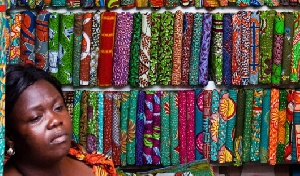The Ghana Employers Association (GEA) has called for severe punishment for smugglers of counterfeit pharmaceutical products and textiles into the country to deter the practice and save local industries.
Alex Frimpong, the association’s chief executive, believes the current punishment of a fine not exceeding GH¢ 24,000 or three years imprisonment or both is not enough to save local industries badgered by the influx of counterfeit products.
“The current maximum amount of GH¢24,000 or a jail term of three years is not high enough to deter people. The penalty should be set higher,” he said at a media interaction on a new initiative by the GEA to combat the illicit trade.
The manufacturing sector is one of the industries struggling in the face of high cost of raw materials, high cost of credit, and importation of cheap counterfeit products mainly from Asia.
A few decades ago, textiles-producing companies in the country employed over 30,000 workers, but there are now just two remaining that employ a total of 3,000 workers.
The new initiative by the GEA, dubbed “Advocacy to Combat Counterfeit and Illicit Trade”, is being undertaken in partnership with the BUSAC Fund to, chiefly, research into the impact of the practice, sensitise stakeholders and push for a harmonised anti-counterfeiting legal framework with effective punishment for culprits.
Busac Fund is providing GH¢77,000 financial support, with the GEA contributing 10 percent of the amount to support the initiative.
The GEA has so far held a sensitisation workshop in Accra for all stakeholders and is scheduled to organise another in the Ashanti Region shortly.
It is estimated that about 40 percent of textiles imported into the country are pirated. The situation is more alarming in the pharmaceutical sector, where despite the invention of the mPedigree software by Bright Simons for checking counterfeits -- and the seizure of large amount of fake products by the Food and Drugs Authority -- the practice continues to flourish.
A Joint Anti-Piracy Taskforce was set up by government to check pirated textiles in the markets, but its work was suspended last year after traders complained of harassment by members of the taskforce.
B&FT has learnt that the taskforce has just been reconstituted and will soon re-start its work.
Some textile workers’ groups have called for an outright ban on the importation of textiles into the country, but this suggestion has been rejected by the Trade Ministry.
Charles Asante-Bempong, the manager of the GEA-Busac Fund project, said increasing illegal trade activities are badly affecting the business of domestic producers, leading to significant loss of jobs, especially in the textile and pharmaceutical sectors.
He said counterfeits spoil the good name of genuine products and crowd them out of the market, leading to depressed earnings for manufacturers and legitimate trademark owners.
Business News of Thursday, 24 July 2014
Source: B&FT













